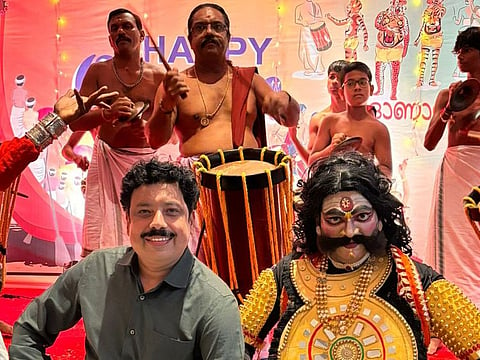Onam more than just a cultural celebration
Bestselling Malayali author Anand Neelakantan on Onam & his personal connection

Anand Neelakantan is known for his unique ability to blend ancient folklore with contemporary narratives. Bestselling author, screenwriter, and motivational speaker, Neelakantan’s works often explore the rich tapestry of India's mythological and cultural history, bringing to life characters and stories passed down through generations.
The author of over 15 books, including his most recent The Asura Way where he explores how a “contrarian way of living that makes more sense” in these times, Neelakantan is also a columnist, and actor, with his works adapted into various Indian languages and TV series.
Neelakantan firmly believes that Kerala’s folklore, steeped in centuries of oral tradition, continues to shape modern narratives, especially those surrounding Onam and the legendary King Mahabali. The festival, he says, is more than a cultural celebration. “The concept of Onam has influenced not just the cultural space but even Kerala’s political outlook. There are not many festivals celebrated in the honour of a just and noble ruler like Mahabali. The ruler is not celebrated for winning wars or for his conquests but for ruling well and ensuring equality among his subjects,” says Neelakantan.
Hailing from Kerala but a Mumbai resident for over a decade now, Onam for Neelakantan is now a blend of tradition and modernity. “Onam here is a different affair,” he notes, describing how the festival is celebrated in urban settings, often within the confines of event halls and on dates far removed from the actual Onam. “The rituals have adapted to urban lifestyles — flower carpets are ordered online, and the sadya is catered, not to mention taking the regulation Onam selfie.”
Despite the commercialisation that has crept into Onam, Neelakantan believes that the festival still holds the power to unite people. “At its core, Onam still retains the power to bring all people together. It cuts across caste, creed, and religion and is truly a national festival for Malayalis, wherever they are.”
For many non-resident Keralites, the nostalgia associated with Onam transforms it into a golden memory of a utopian past that may never have existed, he says. “This is utopia doubled—the Kerala of a golden past that never was and the other of a perfect future that never will be. But it is such dreams that hold us together. ”
As an author, Anand envisions writing a book on Mahabali one day, continuing his exploration of the timeless dreams and ideals that define human existence. “My writing is my journey to fulfill that dream,” he concludes.



